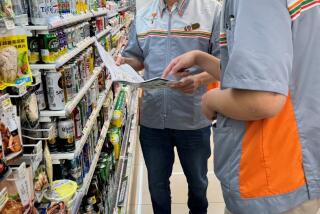Asia Provides Odd Mixture of Memories
- Share via
A few sidelights on a trip through some major Asian cities:
America may have trouble exporting many things but apparently not its music. Shop in a department store almost anywhere--Tokyo, Seoul, Hong Kong--and the accompaniment is background music from home. At the Evergreen Department Store in downtown Taipei, it was Loretta Lynn and “I’m just a coal miner’s daughter.”
It recalls an experience about 10 years ago in a remote part of West Germany where a wedding party in the local inn danced all night to the strains of “Bonanza,” sung in English.
Talk about proposed tax reform mucking up the real estate business. In Taiwan, the government follows Sun Yat-sen’s teachings and treats appreciation in property values as something created by society as a whole, hence belonging to society as a whole. Other than the cost of improvements, most of the appreciation is taxed away.
It’s part of Taiwan’s form of egalitarianism, which transferred land to small farmers years ago and now stresses education for all and keeping the countryside up with the city. Mainland China tried egalitarianism, too, but less benevolently, and stifled the enterprise that thrives on Taiwan.
A bit of inventiveness allows General Instrument of Taiwan, an affiliate of the American company, to tap a rich source of labor for its plants. It operates a special five-hour daily shift at 75% of a full day’s pay just for students and housewives who can only work part-time. The company also pays its managers a so-called “position allowance,” taking into account their need to send wedding and baby gifts and otherwise contribute to family events of their employees.
A little free speech irony: In Peking, an American business representative gets chastised by his home office for talking to an American newspaper correspondent there, mainly for admitting to turning a profit. It’s the kind of thing that often shuts up U. S. executives. Meantime, a Chinese functionary, far from official channels and apparently feeling no qualms, talks openly about the profits of the enterprises she helps to oversee.
Western-style articles are showing up in China at a rapid pace these days, including tight-fitting jeans and high heels for the young women. But even in the big city, some women have never seen pantyhose or tampons. Of course, contrasts like that are everywhere. Brand-new Toyotas compete with horse-drawn wagons on Peking streets; the most common truck often seems to be one with three wheels and pedals. You can travel all day and not spot a service station.
Japan may turn out a cornucopia of consumer goods but it’s hardly a consumer’s paradise. Discount stores don’t put much pressure on the mainline department stores. A Japanese camera bought even at a small off-price shop in Tokyo is available for about 10% less in Hong Kong. A lightweight Japanese electronic typewriter costs $40 more in Tokyo than on sale in Los Angeles.
Food prices are worse. Japanese families pay more for one orange than Americans do for a pound, and twice as much for beef, both products under import restrictions. U.S. farmers could make it a lot cheaper for the Japanese to eat, leaving them more disposable income to sop up a few cars. Families there spend 26% of their cash on food compared with 20% for families in the United States.
You think American newspapers have trouble getting things right? Think of the Chinese. The keyboard on a standard U.S. newsroom computer terminal has three dozen keys for letters and numbers. One at the Economic Daily in Peking has 392 character keys and there are 16 ways to use each one. That’s 6,272 characters.
The paper doesn’t have to worry much about getting into hot water with government sources, however. It is the government. Even so, it’s trying to do its part to cut down on government red tape. In a recent effort, its reporters called government ministries and then prepared a table to show how long it took each to answer its phone.
More to Read
Inside the business of entertainment
The Wide Shot brings you news, analysis and insights on everything from streaming wars to production — and what it all means for the future.
You may occasionally receive promotional content from the Los Angeles Times.










